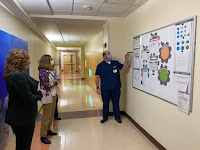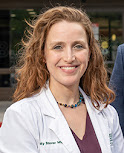In usual times, our adult Emergency Department sees 160 patients on a busy day. Over the last week, the ED has been seeing more than 260 patients per day. This dramatic increase is due to the number of people seeking testing for COVID-19 since the Omicron variant has come to Maryland. The increase has overwhelmed both our adult and pediatric emergency department staff.
When people are significantly ill with a respiratory pathogen such that they are having difficulty breathing, it is very important for us to identify the cause of the illness, so we can deliver evidence-based therapy. It is therefore critical to assure that we have adequate supplies to test patients who may need to be admitted to the hospital. On the other hand, for people who have no symptoms or mild symptoms, knowing the cause is not helpful since we will recommend rest, drinking adequate fluids, and taking over-the-counter medications for pain relief no matter what virus is to blame. I accept that there are other reasons why people seek testing. Many schools are requiring testing for attendance if the student has had an exposure or has any symptoms associated with COVID-19, for example. Others may have a frail elder or someone with chronic illness in their homes and they do not want to expose them to COVID-19. Today, these are not valid reasons to use the Emergency Department. We must leave the staff free to treat those who are sick.
To help lessen the strain on our ED staff, we are opening three testing sites. Two of them are on the GBMC campus. The first will be in the trailer outside the ED. Here, we will accommodate those who come to the ED seeking testing and, after a screening exam, are judged to not be very sick.
Beginning Monday, Jan. 3, testing will also be available by appointment on the first floor of the William E. Kahlert Physicians Pavilion North. For more information on these two testing sites please visit www.gbmc.org
If you’re a GBMC HealthPartners primary care patient, you can schedule an appointment for a COVID test at our Padonia Plus location by logging on to your MyChart account.
If you have concerns about your health and are not having difficulty breathing or some other true emergency, please contact your primary care provider. To keep yourself and others safe, please act as if everyone you meet is infected with COVID-19. Wear your mask, stay physically distant and wash your hands. Obviously, if you have not been vaccinated or had your booster, please take care of this as soon as possible. You are putting yourself and others at risk if you are not fully vaccinated.
As 2021 ends, I would like to again offer my heartfelt thanks to our doctors, nurses, other clinicians and support staff, for their hard work on the frontlines as the battle against COVID-19 continues. Thank you all for your courage, strength, generosity, and perseverance.
Additionally, I want to thank our community and patients for trusting us with their medical care in 2021. It is an honor to serve you.
We should reflect on all the GBMC HealthCare System’s accomplishments in 2021.I will never forget the groundbreaking for The Promise Project in September. It has been exciting to see the demolition and site preparation that has happened so far. Construction will continue through 2022 with the grand opening scheduled for late summer of 2023. The Promise Project will create physical space that will make it easier for our staff to get the job done.
Some of our other noteworthy accomplishments in 2021 included:
--We opened the new Gilchrist Center Baltimore at Stadium Place. This new facility brings state-of-the-art end-of-life care to many in the city including Baltimore’s most marginalized people.
--We had 135 members of our medical staff across 69 specialties named "Top Docs" in Baltimore magazine. We are honored to have more “Top Docs” than any other community health system.
--Our Nurse Residency Program received re-accreditation with distinction from the American Nurses Association. The program was accredited with distinction by the American Nurses Credentialing Center's Commission on Accreditation in Practice Transition Programs.
--GBMC was recognized as a HIMSS Davies Award winner…AGAIN! This is the third time we have received this impressive recognition!
--Our Primary Stroke Center achieved the 2021 American Heart Association’s Get With The Guidelines® (GWTG)-Stroke: Gold Plus with Target: Stroke Elite Honor Roll and Target: Type 2 Diabetes Honor Roll. These awards recognize hospitals that meet specific quality measures for the diagnosis and treatment of stroke patients and are a testament to our Stroke Center’s commitment to reliably deliver care according to the latest scientific evidence.
--GBMC was recognized as the #4 hospital in Maryland in US News and World Report Rankings. --GBMC HealthCare was recognized as the best in several disciplines by the readers of The Baltimore Sun! The Baltimore Sun readers named GBMC HealthCare the best in the following categories: Best Hospital; Best Audiologist; Best General Practitioner.
--GBMC HealthCare had 13 nurses recognized in Baltimore magazine's annual “Excellence in Nursing” edition.
This short list only recognizes a few of our accomplishments. What others shall we celebrate? Please share your thoughts.
We look forward to continuing our work toward our vision of being the community-based true system of care that can deliver to everyone the care that we want for our own loved ones. I will be delighted to see the pandemic fade into the sunset in 2022. I am so grateful for everything that my GBMC teammates have done in the face of adversity. I hope that you and your families continue to stay safe and I wish you all a happy and prosperous New Year!


































